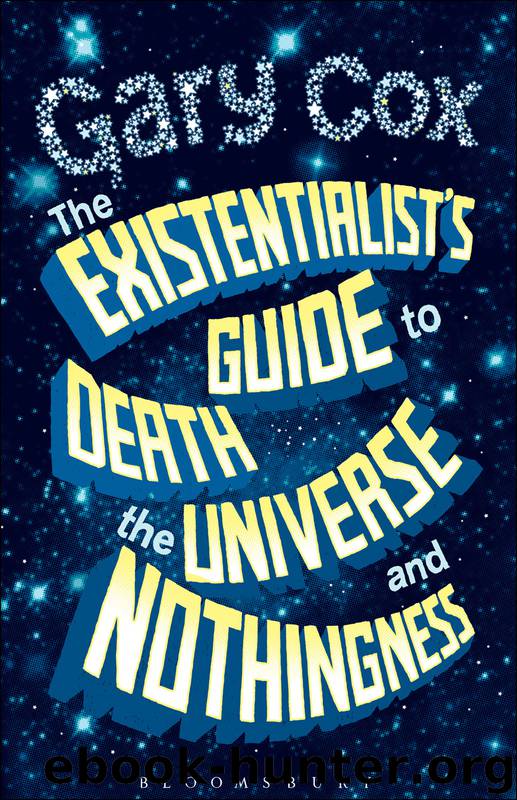The Existentialist's Guide to Death, the Universe and Nothingness by Cox Gary

Author:Cox, Gary [Cox, Gary]
Language: eng
Format: epub
Publisher: Bloomsbury_Academic UK
Published: 2011-11-16T16:00:00+00:00
I was born from writing: before that, there was only a reflection in a mirror. From my first novel, I knew that a child had entered the palace of mirrors. By writing, I existed, I escaped from the grown-ups; but I existed only to write and if I said: me – that meant the me who wrote. (Words , p. 97)
Sartre claims in Words that it was his desire for heroic immortality as a writer, set alongside his early dismissal of Christian notions of salvation and the afterlife, that motivated him rather than any particular gift or genius. He is fond of arguing that genius is as genius does. ‘The genius of Proust is the totality of the works of Proust; the genius of Racine is the series of his tragedies, outside of which there is nothing’ (Existentialism and Humanism , pp. 41–42). Sartre deliberately set out from childhood to create himself as a ‘genius’ through sustained hard work and unflinching self-belief.
Constantly making himself a writer through the act of writing enabled Sartre to maintain an illusion of substance and purpose that effectively kept at bay those disturbing childhood feelings of pointlessness and superfluity. He maintained this grand illusion so well by his efforts, believed so strongly in his vocation, in his capacity to achieve his destiny, that as a young man he was, unlike his friends, untroubled by fears of an untimely death. ‘I had forearmed myself against accidental death, that was all; the Holy Ghost had commissioned a long-term work from me, so he had to give me time to complete it’ (Words , pp. 123–124).
Towards the end of Words the ageing writer finally writes himself out of the grand illusion that has sustained him since childhood. He finally confronts what he has always known, what he has spent the greater part of his life striving to deny, that writing or any other activity cannot remove his superfluity and make him a necessary being at one with himself. Like everyone else he remains a ticketless traveller on a journey to nowhere. ‘I have become once again the traveller without a ticket that I was at seven’ (Words , p. 157). Despite his monumental efforts he remains contingent and mortal, his immortal status as a writer existing only for future generations of equally contingent mortals.
The fundamental choice is the original and most fundamental attempt on the part of consciousness to escape the utter contingency and superfluity of its being. By choosing itself as a particular kind of lack it hopes to make sense of its being by overcoming that lack; as though in a final act of complete overcoming it could establish an ultimate raison d’être for its otherwise contingent being. But of course, there can be no final act of overcoming whereby consciousness establishes itself as a determinate, necessary being once and for all.
Though consciousness constantly aims to overcome the lack that it is, it can never do so. Only death can annihilate the lack that a person is.
Download
This site does not store any files on its server. We only index and link to content provided by other sites. Please contact the content providers to delete copyright contents if any and email us, we'll remove relevant links or contents immediately.
The remains of the day by Kazuo Ishiguro(7580)
Tools of Titans by Timothy Ferriss(6971)
The Black Swan by Nassim Nicholas Taleb(6208)
Inner Engineering: A Yogi's Guide to Joy by Sadhguru(5917)
Giovanni's Room by James Baldwin(5898)
The Way of Zen by Alan W. Watts(5813)
The Six Wives Of Henry VIII (WOMEN IN HISTORY) by Fraser Antonia(4801)
The Power of Now: A Guide to Spiritual Enlightenment by Eckhart Tolle(4776)
Astrophysics for People in a Hurry by Neil DeGrasse Tyson(4631)
Asking the Right Questions: A Guide to Critical Thinking by M. Neil Browne & Stuart M. Keeley(4605)
12 Rules for Life by Jordan B. Peterson(3755)
The Ethical Slut by Janet W. Hardy(3517)
Skin in the Game by Nassim Nicholas Taleb(3485)
Housekeeping by Marilynne Robinson(3424)
The Art of Happiness by The Dalai Lama(3393)
Double Down (Diary of a Wimpy Kid Book 11) by Jeff Kinney(3288)
Skin in the Game: Hidden Asymmetries in Daily Life by Nassim Nicholas Taleb(3276)
Walking by Henry David Thoreau(3240)
12 Rules for Life: An Antidote to Chaos by Jordan B. Peterson(3211)
